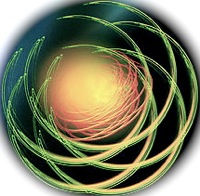Difference between revisions of "Gift"
| Line 11: | Line 11: | ||
*'''''[[Spiritual Gifts]]''''' | *'''''[[Spiritual Gifts]]''''' | ||
| − | == | + | ==Quote== |
| − | + | The [[universal]] [[economy]] is based on intake and output; throughout the [[eternal]] [[career]] you will never encounter monotony of inaction or stagnation of [[personality]]. [[Progress]] is made possible by [[inherent]] [[motion]], advancement [[grows]] out of the [[divine]] [[capacity]] for [[action]], and [[achievement]] is the child of [[imaginative]] [[adventure]]. But [[inherent]] in this [[capacity]] for achievement is the [[responsibility]] of [[ethics]], the [[necessity]] for recognizing that the world and the [[universe]] are filled with a multitude of [[differing]] [[types]] of [[beings]]. All of this [[magnificent]] [[creation]], including yourself, was not made just for you. This is not an [[Ego|egocentric]] [[universe]]. [[The Gods]] have [[decreed]], "It is more blessed to give than to receive,"[http://nordan.daynal.org/wiki/index.php?title=Book_of_Daniel#Chapter_5] and said your [[Master Son]], "He who would be greatest among you let him be server of all."[http://nordan.daynal.org/wiki/index.php?title=Gospel_of_matthew#Chapter_20] | |
| − | |||
| − | |||
[[Category: General Reference]] | [[Category: General Reference]] | ||
Revision as of 15:00, 22 March 2012
A gift is the transfer of something without the expectation of receiving something in return. Although gift-giving might involve an expectation of reciprocity, a gift is something given freely.
In many human societies, the act of mutually exchanging money, goods, etc. may contribute to social cohesion. Economists have elaborated the economics of gift-giving into the notion of a gift economy.
By extension the term gift can refer to anything that makes the other happier or less sad, especially as a favor, including forgiveness and kindness.
Presentation
When material objects are given as gifts, in many cultures they are traditionally packaged in some manner. For example, in Western culture, gifts are often wrapped in wrapping paper and accompanied by a gift note which may note the occasion, the recipient's name, and the giver's name. In Chinese culture, red wrapping connotes luck.
See also
Quote
The universal economy is based on intake and output; throughout the eternal career you will never encounter monotony of inaction or stagnation of personality. Progress is made possible by inherent motion, advancement grows out of the divine capacity for action, and achievement is the child of imaginative adventure. But inherent in this capacity for achievement is the responsibility of ethics, the necessity for recognizing that the world and the universe are filled with a multitude of differing types of beings. All of this magnificent creation, including yourself, was not made just for you. This is not an egocentric universe. The Gods have decreed, "It is more blessed to give than to receive,"[1] and said your Master Son, "He who would be greatest among you let him be server of all."[2]
